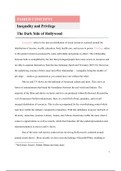Inequality
refers to the uneven distribution of social resources centered around the distribution of income, wealth, education, food, health care, and access to power.
Privilege
refers to the greater resources possessed by some individuals and groups to others. The relationship between both is exemplified by the fact that privileged people have more access to resources and are able to separate themselves from the less fortunate (Jacob and Townsley 2019:16). However, the underlying concept of their cause and effect relationship — inequality being the mother of privilege — tends to go unnoticed as you cannot have one without the other. Movies and TV shows are the hallmark of American culture and unity. They serve as forms of entertainment that break the boundaries between the real world and fantasy. The majority of the films and shows we know and love are produced within Hollywood. Beyond the veil of innocence Hollywood presents, there is a world full of bias, prejudice, and overall unequal distribution of resources. This is also accompanied by the overwhelming control white men have within the industry compared to minorities. With this imbalance in power and lack of diversity, minorities (women, Latinos, Asians, and African Americans) suffer the most when it comes to opportunities as well as awards, which then branches off into underrepresentation and misrepresentation in movies and tv shows. One of the most well-known controversies involving Hollywood is centered around annual award shows
1
. More recently we have seen the hashtag, #OscarsSoWhite, trending in 1 The Emmys, Oscar’s, Golden Globes and many more. 1 January due to the white-washing of the nominees in all the categories (Dargis 2016). White-washing is the blatant disregard of potential nominees and nominees of color, which is an influential and well established part of the industry. Year after year, actors of color are blocked from receiving the awards they rightfully deserve due to a skin-deep and systemic issue that Hollywood just cannot seem to shake off. It all boils down to the degrading pattern of:
if the nominators can’t stop minorities from making the movie or being a part of it, they prevent minorities from getting nominated and or winning.
Privilege in Hollywood exists in the form of favoritism and power held by a select group of people. Given the history of systematic racism and its predecessor, slavery, privilege in Hollywood is intistutionalized and benefits white men. Many of the major production companies that we know, MGM, 20th Century Fox, and Paramount, were founded by white men, for white roles and a white audience. Since the 1930’s, the lack of diversity has snowballed into a vicious cycle of white privilege, making it a center of inequality and institutionalized racism.
Even though Hollywood in the 20th century became more diversified, white privilege and inequality still reign. This is evident in the fact that many minorities are to this day becoming the firsts, second or third to earn an award in a particular category. The importance of minorities winning such awards is that it would show that the institutions and systems put in place to be an obstacle are being broken down, however, true progress is yet to be made. From afar this may not seem as a big deal to many but, in Hollywood, recognition is a big part of actors getting their next gig. In all aspects of Hollywood, blatant manipulation and marginalization impedes the exposure of female actors, a common side effect for women outnumbered by their white male counterparts. Its origins being the popular misconception that movies starring women or made by women or geared towards women are uninteresting (Vogue 2018). When it comes to women, as 2




